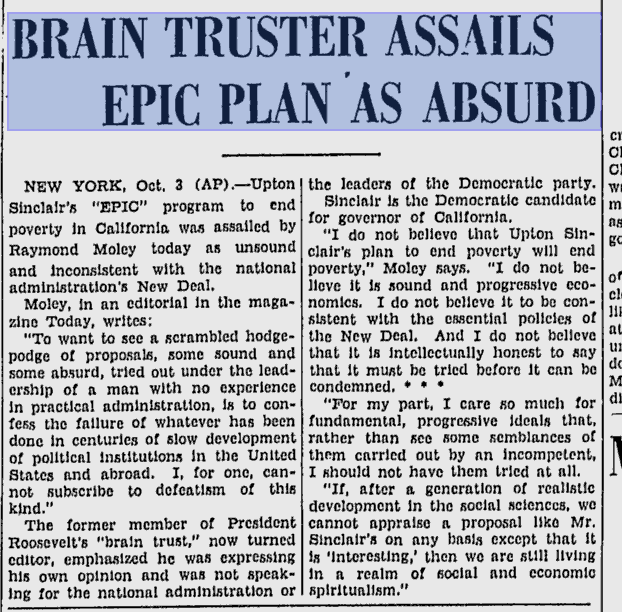starry messenger
Upton Sinclair--California's 1934 EPIC Campaign for Governor
by , 07-09-2011 at 11:47 PM (27888 Views)
Upton Sinclair's EPIC Campaign
Of all the left-wing mass movements that year, Upton Sinclair's End Poverty in California (EPIC) crusade proved most influential, and not just in helping to push the New Deal to the left.Back in the autumn of 1934, political analysts, financial columnists and White House aides for once agreed: Sinclair's victory in the primary marked the high tide of electoral radicalism in the United States. Left-wing novelist Theodore Dreiser wrote a piece for Esquire declaring EPIC "the most impressive political phenomenon that America has yet produced." The New York Times called it "the first serious movement against the profit system in the United States."
He [Sinclair] had twice run for governor of California on the Socialist line, to little avail, but the election of FDR in 1932 encouraged him to give the Democrats a whirl. While he backed the New Deal, he saw that it did not go nearly far enough. Hugh Johnson, who ran Roosevelt's National Recovery Administration, had allowed big business to subvert its codes, and a national textile strike loomed. Nearly one in four people was on relief in New York, with the numbers only slightly better in many other large cities. Adequate relief payments and some form of social security were promised but still unrealized.
So the country's best-known member of the Socialist Party switched his affiliation to Democrat and used his pen one more time, writing and self-publishing a sixty-four-page pamphlet, I, Governor of California and How I Ended Poverty. Then he set out to make his fantasy true.
Although Sinclair could draw thousands of votes on name recognition alone, he considered a grassroots movement his greatest hope. Thousands quickly rallied to his cause, organizing End Poverty League clubs across the state.
Sinclair swept the Democratic primary. Dozens of EPIC candidates also won races for the party's nod for the State Senate and Assembly, including Augustus Hawkins and Jerry Voorhis , both future Congressmen. "It is a spontaneous movement which has spread all over the state by the unpaid labor of tens of thousands of devoted workers," Sinclair noted. "They were called amateurs but they have put all the professional politicians on the shelf." All that stood between EPIC and the governor's mansion was a hapless GOP hack named Frank "Old Baldy" Merriam, who had become governor after the death of "Sunny Jim" Rolph.
Where did FDR stand? A few days after winning the primary, Sinclair took a train east to meet with the president at Hyde Park, under the glare of national press coverage. The White House was torn. Sinclair was a true radical and a loose cannon. Roosevelt and his political director, Jim Farley , feared that the president, already accused by the right of being a socialist—led by Father Coughlin , the Glenn Beck or Rush Limbaugh of his day—could not afford this taint. Those tilting to the left, such as Eleanor Roosevelt and Harry Hopkins, were far more enthusiastic about EPIC. And then there was the rather significant matter of Sinclair being the party's nominee in a year when controlling a major statehouse was vitally important. FDR believed the greatest challenge for the head of a democracy was not to fend off reactionaries but to reconcile and unite progressives.
During the Hyde Park meeting FDR suggested that "experiments" within the overall New Deal framework could be valuable. Sinclair was elated, but the president held off any public endorsement.
Meanwhile, EPIC organizing surged in California. The number of local chapters was now more than 800, and circulation of the EPIC News reportedly hit a staggering 2 million. Black precincts that had reliably voted Republican (the legacy of Lincoln) now split down the middle. Even a few Hollywood screenwriters, such as Dorothy Parker, who normally kept their politics under wraps in the right-wing movie colony, spoke out for Sinclair. So did Charlie Chaplin .FDR, displaying an Obama-like tendency, waited, refusing to make a bold move to help Sinclair ward off the savagely unfair assaults. As a result, Sinclair fell behind in the polls—and then the president was advised to not endorse a probable loser. Farley sent an emissary to California to strike a deal with Merriam: if the GOP governor promised to back the New Deal down the road, the White House would remain silent on Sinclair.



 Email Blog Entry
Email Blog Entry
